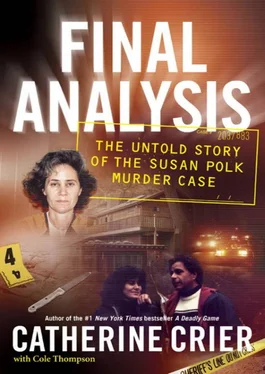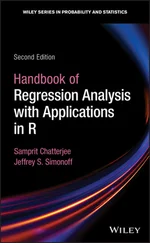Susan stared blankly at the tanned, older man when he asked if she had anything she wanted to discuss. “I don’t feel like talking.”
“That’s okay,” the psychologist soothed. “I’ll talk for you.”
Felix Polk spoke in a slow, deliberate tone. His gravelly voice had a faint accent, almost like a lisp, that was more pronounced when he said certain words.
Susan sat, watching his movements and listening to him speak. There was something about this man that caught her interest. He seemed to know how to pay attention to a young person. Slowly, she began to feel at ease in his presence.
“What do you like to do at home?” he asked.
“I like to read,” Susan told him.
Her response seemed to intrigue the psychologist. Dr. Polk appeared genuinely impressed that Susan was currently reading Dostoevsky, Chekhov, and Tolstoy, and his interest appeared sincere. She felt flattered when this successful, professional man who was much older, and certainly wiser than she, gave her compliments. Suddenly, Susan felt important and smart. Dr. Polk was twenty-five years her senior, yet she felt the two had made a connection.
Their subsequent sessions were better. Talking about books was easy for Susan. Reading had always been a passion, a way to escape the drudgery of life, and the pain of her absent father, her working mother, and her frustrated, rageful older brother.
Just like her truancy, Susan kept her sessions with Dr. Polk a secret. The therapist had instructed her not to disclose their discussions, and she agreed. She liked the idea of knowing things that nobody else knew—not even her mother.
Already, Dr. Polk had told Susan that she was a lot like him. She was shy, withdrawn, and self-conscious. She wasn’t crazy, just quiet.
It was her mother who was “crazy” and a “bitch,” he announced.
Polk’s assessment had huge appeal to Susan. She had been protective of her mother and had defended her vehemently to her father. Her parents had divorced when she was five years old. But at fifteen, she began blaming her mother, Helen, for the way her life was going.
Susan was angry that they didn’t have more money and that she didn’t have better clothes. Their tiny apartment was furnished with items her mother purchased at Good Will, while her closet was full of old clothes and other items from a secondhand boutique. Susan wanted to live in a nicer house and go to a better school with people who were smarter, people who were more like her. Faulting her mother for her unhappiness, as Dr. Polk suggested, was a good tactic, and Susan latched on to the idea. Her new therapist would often speak aloud what she was thinking, as if he could read her mind.
Susan’s resentment of her mother ran deeper than that of a typical teenager toward a parent. Her feelings were heightened by her mother’s lack of understanding and her constant excuses for her brother’s erratic behavior. Helen Avanzato Bolling was a no-nonsense type. The fiery, tiny-boned woman stood barely five feet tall. On her own since she was fourteen, she was extremely street savvy. She had supported herself for several years before marrying Theodore Dickson Bolling Jr., an undergraduate student at San Francisco State University in downtown San Francisco.
In February of 1956, not long after the couple married, Helen gave birth to a son, David. The following year, on November 25, 1957, Susan was born. At first, life was agreeable, and Helen stayed at home to raise the two children. But everything changed shortly after Susan’s father announced a desire to attend law school. When they married, Susan’s mother made herself a promise not to interfere with her husband’s aspirations. Faced with this decision, Helen didn’t stand in his way.
The choice was a costly one. Theodore Bolling was hardly ever home. His day job, followed by his studies at Southwestern University in downtown Los Angeles, ate up all of his time. His absence was difficult for Susan, who adored her father and his rare but sweet attention.
To soothe her children, Helen Bolling made promises. “Someday daddy will be out of school, and things will be different,” she assured them. “Then you’ll have a real daddy.”
But that time never came. As Helen soon learned, her husband had begun an affair that progressed rapidly. Upon completing his studies, Theodore Bolling asked for a divorce. On August 28, 1962, he was admitted to the State Bar of California, and his final departure came shortly thereafter.
Helen was devastated, but little Susan was inconsolable.
The divorce destroyed Susan and, according to her mother, the child “was left with an empty hole she could never seem to fill.” After the split, Helen quickly rented out the small house she’d won in the divorce settlement, relocating her children to a cheaper apartment in East Oakland. It was the first of several moves, each of which forced Susan and David to disconnect from their peers and start over.
Instead, Susan turned to books. “They are my friends,” she told her mother. When Susan did finally fall in with a group of girls in junior high school, Helen Bolling let it be known that she did not approve of one of the teens. Her criticism sparked additional friction between mother and daughter.
Like Susan, David had also been labeled as “gifted.” Yet he, too, had stopped attending school. When he wasn’t locked away in his room reading science magazines or building homemade rockets in the basement, he was taunting Susan, threatening her and pushing her around.
David fell in with a bad crowd while the family was living in Concord. Susan’s mother tried to intervene and, at one point, even sublet their apartment and moved her children to a better area in downtown Oakland to get him away from the rough neighborhood. To Susan it appeared that her mother was pacifying her brother despite his bad behavior, while punishing her for trying to escape his persecution. With her mother at work much of the day, Susan was an unprotected target for David’s rage.
Susan tried to tell her mother what was going on, but her cries for help seemed to go unnoticed; after all, it was the Dr. Spock era when hands-off parenting was encouraged. Nevertheless this method was backfiring. What Susan really needed was strong parental supervision and intervention, but Helen Bolling was not capable of such discipline. With Susan’s dad now raising his new family in Sacramento, the kids had no other role model, and his presence in their lives was inconsistent and fleeting.
As the torment with her brother escalated, Susan could no longer bear the burden that home life placed on her. With nowhere else to turn, she ran away from home. Her mother was furious and reported Susan as a “runaway.” She allowed authorities to place the twelve-year-old in juvenile hall to teach her a lesson. More than two years later, Susan still hadn’t forgiven her mother.
On her fourth therapy session with Dr. Polk, the therapist asked Susan if she’d be willing to try something new and radical.
“Would you consent to be hypnotized?” he asked. “I think you have various memories of trauma in your past. Do you want to dig those up?”
Cool, Susan thought. The idea of being hypnotized sounded intriguing.
Even if she wanted to say no, she didn’t feel she could. Dr. Polk was a psychologist. He knew what was best for her, and besides she had read that it really wasn’t possible to put someone under hypnosis. Regardless, she would do whatever he asked.
Susan watched eagerly as Dr. Polk strode to the small kitchen in the rear of the office and poured something into a teacup.
“This will relax you,” he said in a nurturing voice, handing Susan the steaming liquid.
The scent was hauntingly familiar. Yet as she drew her first sip, she didn’t recognize the taste. Feeling very mature, Susan relaxed into the big leather chair. Sipping from the cup, she felt a warm sensation and began to feel sleepy.
Читать дальше











